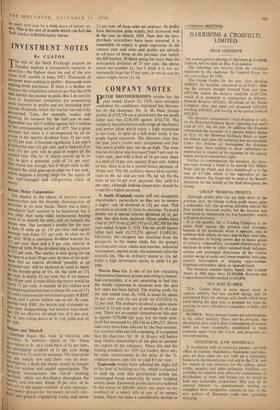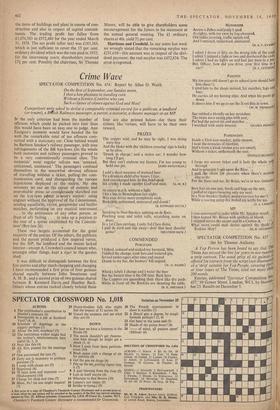COMPANY NOTES
PETER BROTHERHOOD'S results for the year ended March 31, 1958, have certainly confirmed the confidence expressed last Novem- ber by the chairman, Mr. A. M. Neal. Group profits of £532,758 are a record and the net profit (after tax) was £240,508 against £164,778. The company manufactures a wide range of machinery and power plant which enjoy a high reputation in the trade. In spite of a full order book, it has ample liquid resources. The directors state that the past year's results were exceptional and that this year's profits may not be so high. The June interim dividend was increased from 5 per cent, to 6 per cent., and with a final of 18 per cent. there is a total of 24 per cent. against 20 per cent. Added to this, there is to be a special bonus payment of 10 per cent. The 10s. ordinary shares have recently risen to 40s. 6d. and are now 37s. 6d. xd. On the basis of the 24 per cent, payment, they yield 6.4 per cent., although looking ahead there should be scope for a higher payment.
S. Smith (England) results will not disappoint shareholders, particularly as they are to receive a higher rate of dividend at 12f per cent. This payment is covered 31 times by earnings. To avoid profits tax a special interim dividend of 21 per cent, has also been declared. Gross profits have risen in 1957 from £2,847,193 to £3,182,308 for the year ended August 2, 1958. The net profit figures (after tax) were £1,255,524 against £1,603,161. Obviously the company has benefited from the prosperity in the motor trade, but the group's activities also cover clocks and watches, industrial instruments, marine radar, the automatic pilot for aircraft. etc. The 4s. ordinary shares at I Is. 6d. enjoy a high investment status, to yield 4.4 per cent.
Norvic Shoe Co. is one of the few remaining independent footwear groups and owing to intensi- fied competition, it is not surprising to find that the steady expansion in turnover over the past few years has been halted. The trading profit for the year ended June 30, 1958, is down by about 20 per cent, and the net profit (at £157,921) by 32 per cent. The ordinary dividend is again main- tained at 25 per cent. out of earnings of 44.4 per cent. There are no capital commitments this year as against £270,000 last year, but the bank over- draft has increased by £88,946 to £204,027. Home sales may have been affected by the bad summer, but overseas sales are still expanding. It is expected that the chairman, Mr. W. A. Royce, will before long inform shareholders of the plan to increase the capital of the company. When this and the trading prospects for 1959 are known, there may be some improvement in the price of the 5s. ordinary shares, now 15s. to yield 8.3 per cent.
Eastwoods results have reflected the slight fall in the level of building activity, which is expected to pick up, now that government action has encouraged house ownership by easier building society loans. Eastwoods profits have also suffered to the extent of £60,000 which was spent on the overhaul of a rotary kiln at one of its cement works. There has been a considerable decline in
the items of buildings and plant in course of con- struction and also in respect of capital commit- ments, The trading profit has fallen from £1,076,583 to £972,480 for the year ended March 31, 1958. The net profit (after tax) was £183,369, which is just sufficient to cover the 15 per cent, ordinary dividend which was the rate paid in 1952; for the intervening years, shareholders received 171 per cent. Possibly the chairman, Sir Thomas Moore, will be able to give shareholders some encouragement for the future in his statement at the annual general meeting. The £1 ordinary shares at 40s. yield 71 per cent.
Harrisons and Crosfield. In our notes last week we wrongly stated that the remaining surplus was £231,610—this amount was in respect of the divi- dend payment; the real surplus was £452,834. The error is regretted.







































 Previous page
Previous page